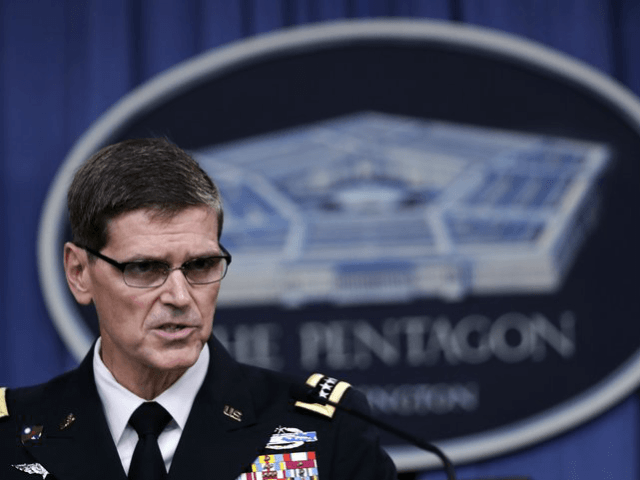The United States military wants to ramp up its campaign against the Taliban, the Islamic State (ISIS/ISIL), and other jihadist groups in Afghanistan beyond the fighting season and into the winter months, declared the top American commander in the Middle East and South Asia.
According to the Pentagon, the U.S. combat mission in Afghanistan remains over, which means American troops are only operating in a train, advise, and assist (TAA) role with the Afghan National Defense and Security Forces (ANDSF) in the lead of security.
Nevertheless, an influx of new U.S. trainers can assist the ANDSF to escalate the fight, Gen. Joseph Votel, the chief of U.S. Central Command (CENTCOM), recently indicated to the Associated Press (AP).
The top general, who is in charge of American military activity in the Middle East and Afghanistan, noted that U.S. troops would “be operating with Afghan units, closer to the front lines and at greater risk, but … U.S. commanders will ensure American and allied forces have adequate protection.”
AP reports that the primary goal is to get the Afghan military campaign going sooner, rather than later.
U.S. troops want to “focus on offensive operations and we’ll look for a major effort to gain the initiative very quickly as we enter into the fighting season,” declared Gen. Votel.
The ANDSF, which includes police and army units, must “keep the pressure on all the time and work to gain the upper hand as quickly as we can. So that as we get into this next fighting season we can build on the initiative,” he added.
Afghanistan’s fighting season tends to cover the months of April to October, with operations carrying into early November.
Gen. Votel’s comments came as reports surfaced that jihadists in the eastern Afghan province of Nangarhar, a known ISIS stronghold located on the Pakistan province, killed a U.S. Special Forces soldier—Army Sgt. 1st Class Mihail Golin.
The recent U.S. military fatality brought the total since the war started in October 2001 to 2,263, including at least 16 since American President Donald Trump took office at the beginning of last year.
Although the U.S. military has deemed Nangarhar an ISIS stronghold, American troops have also been fighting the Taliban in the province.
During Trump’s first year in office, the U.S. military intensified its involvement in Afghanistan, resulting in a record number of airstrikes targeting jihadists, an unprecedented offensive against the Taliban’s lucrative opium business, and a low number of successful terrorist attacks.
Nevertheless, the Pentagon and the United Nations warned that the gains in Afghanistan are frail.
“The hard-won gains in Afghanistan—by the Afghans, the United States, NATO, and the international community—remain fragile, but are worth defending,” cautioned the Pentagon in its most recent assessment of the 16-year-old war in Afghanistan.
“The security situation remained highly volatile, as the Taliban and Islamic State in Iraq and the Levant-Khorasan Province (ISIL-KP) showed continued capacity for inflicting mass casualties amid increased Afghan and international air strikes,” the U.N. Security Council added in a report.
On New Year’s Day, President Trump again blasted Pakistan for refusing to stop harboring jihadists who are killing and maiming American forces and their allies in neighboring Afghanistan, an accusation that Islamabad denies.
The Trump administration has reportedly decided to withhold $255 million in military aid from Pakistan for refusing to take action against terrorist groups, including the Afghan Taliban and its Haqqani Network allies.
Since he unveiled his South Asia strategy, President Trump has been urging Pakistan to stop harboring terrorists.
Marty Skovlund, a U.S. military veteran who served in Afghanistan, predicted that 2018 might turn out to be the deadliest year to date, as American troops stop up operations against the Taliban, ISIS, and other jihadist groups.
In an article for Task & Purpose, he wrote that 2018 “will likely be the bloodiest year to date,” adding, “The violence will get worse before it gets better.”
The veteran noted that “2017 was the first year that the Afghan security forces planned a true year-long campaign that did not recognize the traditional fighting season, and then followed through on it.”
U.S. Trump’s South Asia plan—mainly focused on the war in Afghanistan—has granted the American military greater authority to combat the resilient Taliban and a growing ISIS affiliate, among other jihadists in the region, home to the highest concentration of terrorist groups in the world.
“Beyond boosting troop numbers, Trump has granted his generals’ wishes for fewer combat restrictions, greater authority for commanders and no withdrawal deadline,” notes AP.
“Next year will be the first test of the policy. The Taliban currently controls as much as half of the country,” it adds.

COMMENTS
Please let us know if you're having issues with commenting.